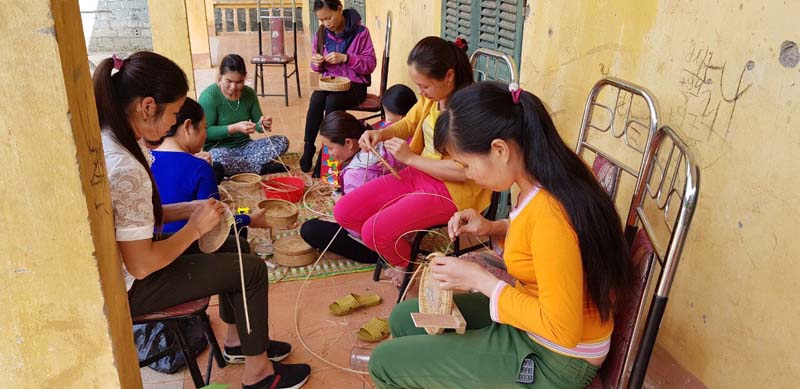
(HBO) - The standing board of the provincial Party Committee on August 29 issued Directive 36-CT/TU on strengthening the Party’s leadership of foreign non-governmental organization (NGO) affairs in Hoa Binh (Directive 36). The implementation of the document has helped enhance the awareness and knowledge of officials and Party members as well as locals in the province on the viewpoint and policy of the Party, and laws of the State on the issue.
 ChildFund organization holds training
courses on rattan weaving for communes in Kim Boi district covered by its
project.
ChildFund organization holds training
courses on rattan weaving for communes in Kim Boi district covered by its
project.
Over the
years, the mobilization of assistance from foreign NGOs in the province has
been implemented in line with the law and directing documents of the Party and
Government.
In the
2015-2019 period, the province launched 134 programmes and projects funded by
50 foreign NGOs and international cooperation agencies, with total committed
investment of over 28.5 million USD. They comprised 117 programmes and projects
funded by NGOs worth 28.2 million USD, and 17 non-project aid packages valued
at 386,235 USD.
Among the
134 programmes and projects, 102 were under the management of the provincial
People’s Committee, and 32 others by central agencies. Total disbursement in
the 2014-2019 period reached 14.3 million USD, including 14.1 million USD for
foreign NGO-funded projects.
Although the
value of foreign NGO-funded projects is not high, the projects have proved high
efficiency in enhancing the living conditions of locals in localities with
difficult socio-economic conditions thanks to their direct approach to the
people and essential sectors such as education, health care, clean water,
environmental sanitation, livelihood, gender equality and children’s rights, as
well as social matters.
Foreign
NGOs have operated in line with orientations. The province has issued
publications and programmes to provide information on foreign NGOs’ operation
in the locality, as well as the province’s needs and prioritized sectors, thus
helping foreign NGO update themselves during the process of surveying, designing
and making project’s documents as well as during the projects’ implementation, thus
improving the living conditions of locals in project sites, while contributing
to strengthening and expanding the friendship and cooperation between the
province and foreign friends./.
The Department of Education and Training of Hoa Binh province held a conference on March 18 to review the performance of the "Safe and Happy School" Project and set out tasks for 2025. The project, funded by the Taiwan Fund for Children and Families (TFCF), aims to create a safe, inclusive, and supportive learning environment for students. The event saw the attendance of representatives from the TFCF and 26 beneficiary schools.
With over 70% of their workers being women, trade unions across industrial parks (IPs) in Hoa Binh have been actively safeguarding their legal rights and interests while implementing initiatives to improve their income and well-being.
In recent years, the Hoa Binh provincial General Hospital has continuously innovated itself and improved the quality of medical services to meet the increasing needs of local people. With substantial investments in infrastructure and modern equipment, along with a team of highly qualified doctors and nurses, the hospital has gradually established itself as one of the leading medical units in the Northwestern region and a trusted destination for healthcare for people inside and outside the province.
From mastering the fundamentals of programming to achieving national recognition, the Programming Club of the Le Van Tam Primary School (STAR LVT28) in Hoa Binh city has made remarkable strides in the field of robotics.
The Ho Chi Minh Communist Youth Union Committee and the Vietnam Youth Federation chapter of Hoa Binh province organised a programme on March 12 to launch the "Digital Literacy" movement and an online quiz on the resolutions of the Vietnam Youth Federation congresses at all levels, as well as the Politburo's Resolution No. 57-NQ/TW on breakthroughs in the development of science, technology, innovation, and national digital transformation.
As climate change grows more unpredictable, the development of production forests has become essential - not just for economic growth, but for safeguarding the environment and maintaining ecosystem balance. By boosting local incomes, curbing natural disasters, preventing soil erosion, and protecting water resources, these forests play a crucial role in sustainable development.



 ChildFund organization holds training
courses on rattan weaving for communes in Kim Boi district covered by its
project.
ChildFund organization holds training
courses on rattan weaving for communes in Kim Boi district covered by its
project.